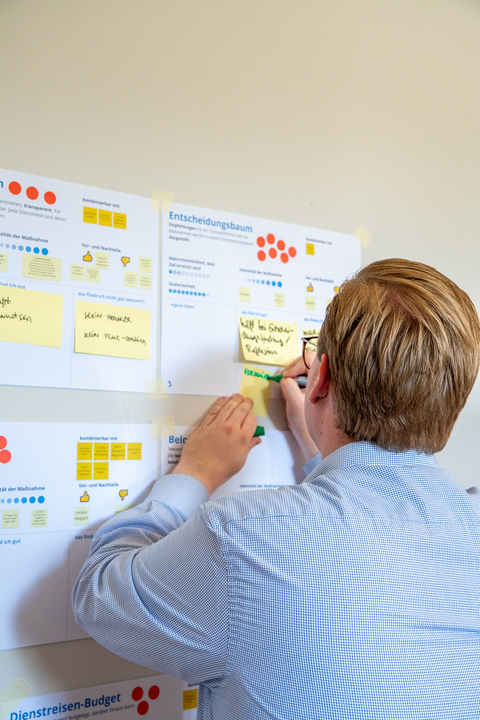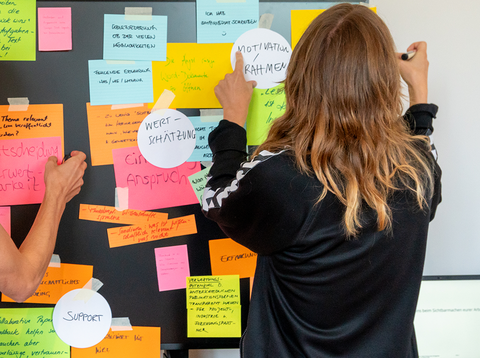Jun 11, 2025
Climate-neutral professorship 2025: Sustainability 360° at the Chair of Industrial Design Engineering
by Kirsten Wolfrath, Science Coordination for the Chair of Industrial Design Engineering (Prof. Dr.-Ing. Jens Krzywinski)
Climate neutrality and coffee are linked by the initial letter. In combination, they form the start of the Chair of Industrial Design Engineering's ambitious goal of no longer having a negative impact on the climate within two years. It was announced as part of a retreat to kick off 2023 - with a barista workshop and strategy session on concrete steps towards sustainability, among other things.
A clear goal in a confusing starting situation: uncertainty is basically a standard condition for the work of designers and, at best, becomes a driver for ingenuity. Volatility, complexity and ambiguity also stand for increasingly challenging framework conditions, including in the university world of work. Agreement on shared values, self-organization, participatory decision-making structures and enthusiasm for design are our answers to these dynamics.
What does this have to do with coffee and climate neutrality? At the subsequent annual closed meeting of our Chair, we agreed to make sustainability the inner compass for the development of our Chair: in our research and teaching, the selection of our transfer projects, but also in the organization of our immediate working environment. We took advantage of the Dresden Fellowship program to tackle this in a professionally sound manner. With Gavin Melles (Swinburne University of Technology Melbourne, Australia), we not only researched and taught on the design of a sustainable circular economy, but also developed a comprehensive sustainability strategy as a framework for measures in the areas of governance, research, teaching, campus & operations and dialog & transfer.
We see the goal of climate neutrality by 2025 as an ambitious development target. Development here also in the sense of a moving target: we want to change the calculated zero in 2025 so that actual emissions also fall. Last but not least, our efforts to reduce offsetting payments are also in the interests of our limited professorial funding. The greatest investment here is undoubtedly the work of our team of three researchers, Nikolas Neumann, Anselm Wohlfahrt and Christiane Kunath. Calculating emissions in an interplay between our own surveys and querying centrally managed operating processes, analyzing potential effects and developing proposals for measures that are supported by the entire professorship team - all of this takes time, effort and, above all, conviction.

Wann ist eine Flugreise gerechtfertigt? Wo bringt KI trotz hohem Energieverbrauch einen echten Mehrwert? Welche Kompensationsmöglichkeiten sind sinnvoll? Nachhaltigkeit bringt ins Gespräch.
Why are we doing this? Just as design as an empirical discipline at the TUD has evolved from designing the form of individual products to setting the course for holistic, sustainable product-service systems, the demands on the design of our own impact environment have also developed. As a Chair and thus part of university self-administration, we ask ourselves similar questions to those we ask in our research: What framework for action do we set? What materials and technologies do we consider, what experiences and contexts do we take into account in our actions? Which partners do we need in order to have a broader impact? In short, how do we design research and development spaces that strengthen responsible and sustainable action?
We now call our project "[td] Positive Lab". Lab stands for its explorative character. We are developing strategies to make the Chair of Industrial Design Engineering greenhouse gas-neutral - in areas such as electricity consumption, thermal energy, business travel and everyday mobility. We will be presenting how we are doing this during Sustainability Week on June 19: the process of data collection, the identification of majorCO2 emitters, the development of reduction strategies, the search for credible compensation measures and our examination of conflicting goals.
Climate-neutral by 2025 - a clear and ambitious goal for our Chair as a visible sign of a more comprehensive sustainability strategy. Behind our goals and achievements are people. We are around 30 researchers, a large proportion of whom are also lecturers, from various disciplines, a model builder, an assistant and a coordinator. We are financed by industry, regional, national and European funding. This is not an unusual situation in higher education: researchers' careers often involve small-scale funding and a high level of coordination. What sets us apart: we are designers! And we love coffee. Anyone who has visited us knows our good coffee, which comes to us by bike from a local roastery in reusable containers. We are currently running a voting process for plant-based milk alternatives. Taste is different. One test variant has consistently achieved a "please don't" rating. Dealing responsibly with risks is also part of our repertoire.

